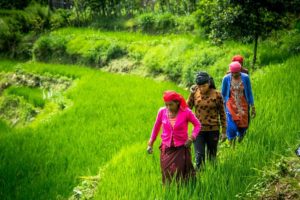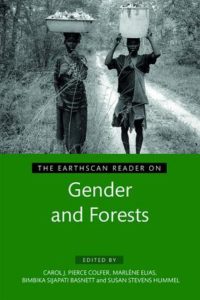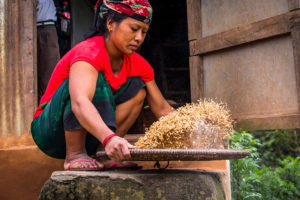
Indonesia’s future leaders in forestry and gender studies had the chance to make connections between their disciplines at the Bogor headquarters of the Center for International Forestry Research (CIFOR) recently.
Reaching out to the next generation of gender and forestry scholars, policymakers, civil society organizations and other stakeholders, CGIAR Research Program on Forests, Trees and Agroforestry (FTA) researchers from CIFOR introduced the Earthscan Reader on Gender and Forests to members of the International Forestry Students’ Association (IFSA) from Gadjah Mada University (UGM) and the Bogor Agricultural Institute (IPB).
Read more: The Earthscan Reader on Gender and Forests
 Launched earlier this year on the sidelines of 125th Anniversary Congress of the International Union of Forest Research Organizations (IUFRO), the reader is an accessible collection of theory, analysis, methodology, case studies and more, spanning 30 years of scholarship. It was edited by Carol J. Pierce Colfer and Bimbika Sijapati Basnett of CIFOR, Marlène Elias, gender specialist at Bioversity International, and Susan Stevens Hummel from the Forest Service at the United States Department of Agriculture.
Launched earlier this year on the sidelines of 125th Anniversary Congress of the International Union of Forest Research Organizations (IUFRO), the reader is an accessible collection of theory, analysis, methodology, case studies and more, spanning 30 years of scholarship. It was edited by Carol J. Pierce Colfer and Bimbika Sijapati Basnett of CIFOR, Marlène Elias, gender specialist at Bioversity International, and Susan Stevens Hummel from the Forest Service at the United States Department of Agriculture.
Read more: FTA gender scientists to launch ‘The Earthscan Reader on Gender and Forests’ during IUFRO congress
Building on the positive reception at IUFRO, the CIFOR event and discussion introduced Indonesian students to the book, which covers the intersections between gender, forestry and natural resource management across disciplines, geographies and historical periods.
Dian Ekowati, a CIFOR senior research officer and a host of the event, noted that the majority of students attending came from a forestry background without a strong gender focus, so should find the reader particularly interesting and thought-provoking.
Read more: Focus on gender research and mainstreaming

“We hope that the discussion will further the students’ aspirations, or inspire them to learn about and integrate gender when looking at forest management during their study, research, fieldwork, and interaction with communities, and for their future work — especially, but not only, for those working in forestry,” she says.
Moderated by Mia Siscawati, a senior lecturer in gender studies at UI, the discussion will feature noted academics discussing the need to consider and mainstream gender into forestry and natural resource management in Indonesia, and the role the reader can play as an important resource for scholars and students.
Originally published at CIFOR.org.
For more information on this topic, please contact Dian Ekowati at d.ekowati@cgiar.org.
This research forms part of the CGIAR Research Program on Forests, Trees and Agroforestry (FTA), which is supported by CGIAR Fund Donors.
This research was supported by UK aid from the UK government.











